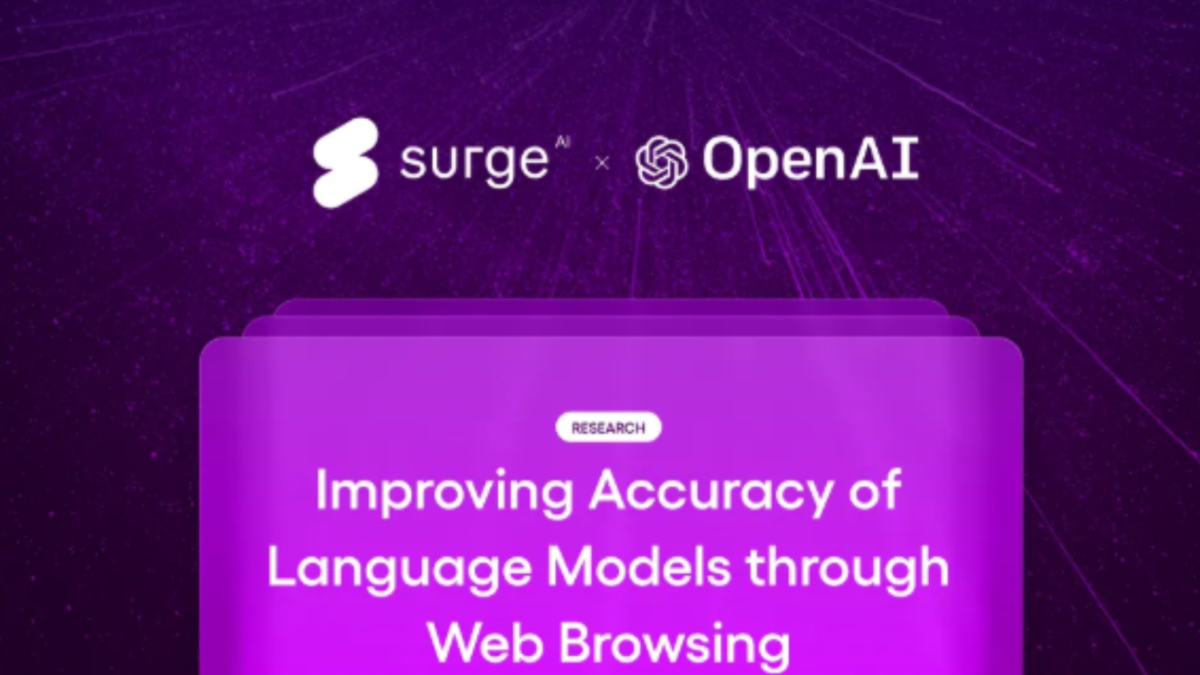Surge AI: The Bootstrapped Data-Labeling Powerhouse Quietly Outpacing Scale AI
Discover how Surge AI, a human-centered, bootstrapped data-labeling startup, is outperforming rivals like Scale AI—while staying profitable, productive, and committed to ethical AI development.
Introduction
We often hear about flashy startups raising billions with little to show for it. But every once in a while, a quiet disruptor comes along that flips the script. That’s what happened with Surge AI—a company you’ve probably never seen trending on Reddit or blowing up on LinkedIn, but one that’s quietly reshaping the data-labeling industry.
As someone who’s followed AI startups closely, I was stunned to learn that Surge AI, which hasn’t taken a dime of outside funding, pulled in $1 billion in revenue last year—leaving Scale AI, its far more hyped rival, in the dust with a reported $870 million in 2024.
And the most surprising part? Surge is doing this by doubling down on human labor, transparency, and fair compensation, rather than cutting corners. That got me thinking: maybe there’s a different way to build powerful, productive AI systems—one rooted in human rights and long-term value.
What Is Surge AI and Why Is It Booming?
- Surge AI specializes in data labeling, the crucial behind-the-scenes task of training artificial intelligence systems. Think of it as the invisible scaffolding behind every chatbot, vision system, and generative model.
- While giants like OpenAI and Google get the credit, they rely heavily on companies like Surge to make their models usable, ethical, and accurate.
- Surge AI operates as a middleman, contracting skilled human workers to refine AI responses—often using those with advanced degrees to improve data quality.
- The company’s mission? To build AI that is “curious, witty, imaginative, and full of unexpected brilliance.” And honestly, don’t we need more of that in this space?
Surge AI vs Scale AI: The Numbers and the Ethics
- Surge AI made headlines in 2024 after outpacing Scale AI’s revenue, despite being completely bootstrapped.
- While Scale attracted attention with Meta’s $14 billion “acqui-hire” deal for CEO Alexandr Wang, Surge stayed laser-focused on customers.
- Surge’s business model prioritizes long-term value and ethical labor practices—in stark contrast to an industry often accused of exploitation.
- Example: I came across a job posting on Surge’s website offering well-above-market rates for annotators with PhDs. That’s not common in the gig economy.
The Human Rights Perspective in Data Labeling
Let’s be honest: data labeling has a dirty secret. It’s often outsourced to underpaid gig workers in developing countries, with little oversight or protection.
- In May 2024, Surge AI was hit with a class-action lawsuit alleging worker misclassification and underpayment. Surge called the claims “meritless,” but the case raises valid concerns.
- Workers doing this labor are the invisible backbone of the AI economy—and their rights matter. If we’re building AI that claims to be ethical, the pipeline itself must be ethical too.
- I believe we should start asking questions like: Are these tools improving human productivity without undermining human dignity? Surge’s model suggests that’s possible—if companies are willing to prioritize it.
Surge AI Founder: Who Is Edwin Chen?
- Edwin Chen, Surge AI’s founder and CEO, is a fascinating figure.
- According to his LinkedIn, he’s an MIT grad who previously worked at Twitter, Facebook, and Dropbox.
- Unlike many in Silicon Valley, Chen maintains a low profile. His old Medium blog focuses on technical topics rather than self-promotion.
- What stands out is his commitment to building a higher-quality alternative to Scale AI, one that pays workers fairly and prioritizes accuracy over hype.
Surge AI on LinkedIn: Focused and Transparent
- Surge’s recent LinkedIn post addressing Scale’s partnership with Meta is worth reading.
- Instead of panicking or spinning PR, they calmly reassured clients: “We became the biggest company in this space by helping our customers build amazing models, not by prioritizing publicity and hype.”
- That’s a rare kind of confidence—and honestly, it’s refreshing.
What People Are Saying: Surge AI on Reddit and Glassdoor
- On Reddit, Surge AI has a growing community of workers and tech enthusiasts. Some threads praise the quality of projects and pay, while others raise concerns about workload and transparency.
- A look at Surge AI’s Glassdoor reviews shows a generally positive vibe, especially for a gig-economy platform.
- Still, no platform is perfect, and these forums serve as important feedback loops. I encourage anyone considering work with Surge to read both the praise and the criticism.
Is Surge AI the Future of Ethical AI Development?
- Surge AI is valued at over $1 billion, based on internal metrics and revenue—not speculative VC hype. (Surge AI valuation is steadily climbing.)
- Despite having no official Surge AI Wiki page (yet), the company is making waves based on merit, not marketing.
- The model they’re pushing—combining human labor with fair wages and advanced AI—isn’t just morally right. It’s also more productive.
- From my own experience in the AI space, I’ve seen how clean, ethically labeled data accelerates model development and reduces post-launch bugs.
Conclusion: Productivity Without Compromise
Surge AI is a case study in how we can scale AI responsibly. By treating human annotators with respect, focusing on data quality, and avoiding the VC circus, they’ve quietly become a market leader.
For anyone working in AI—or just trying to build products faster and better—this is a model worth watching. Tools like Surge don’t just boost productivity; they challenge us to redefine what ethical, human-centered AI should look like.
Want AI that works better and aligns with your values? Maybe it’s time we all take a closer look at Surge AI.
